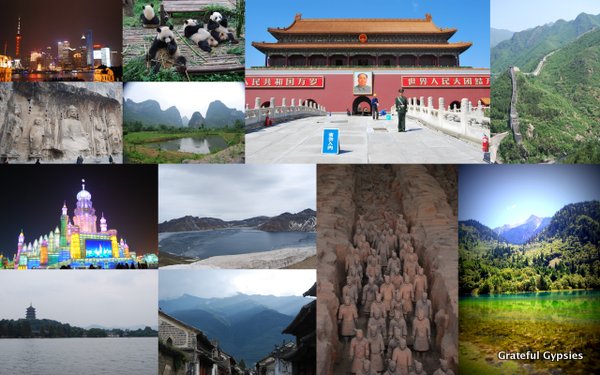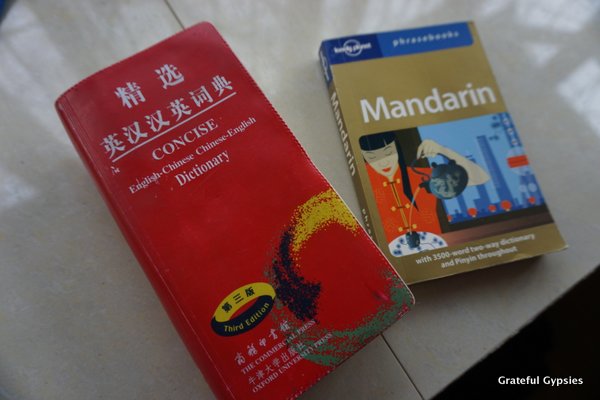10 Tips for First Time China Visitors Posted by sasha on Mar 23, 2015 in Culture
After living in China for five years, I’ve had plenty of experience giving advice to people traveling here for the first time. Thanks to my involvement in the Couchsurfing community, I’ve had tons of guests over the years who have picked my brain about visiting the Middle Kingdom. There are also at least a few times a year where I get that same Facebook message or e-mail – “I’ve got a friend who’s going to China. Do you mind if he gets in touch?” For those of you out there who find yourself in a similar situation – trying to plan a trip to this huge, complicated, perplexing country – here are 10 tips to get you started:
1. Do Your Research

There’s a lot to think about…
Take it from me, China is not the best place to wing it. It’s a vast, diverse, and often times confusing place. Prior to your trip, it’s best to do a solid amount of research as to where it is you want to go and what exactly it is you want to get out of your trip. Get on YouTube, Wikitravel, and of course peruse the archives of our awesome blog to learn a bit more about China, the people, culture, food, and places of interest. Chances are there’s a lot about China you don’t know. For example, did you know that there are actually 56 ethnic groups here? Having a bit of background information will make your first trip to China much more enjoyable.
2. Get Your Visa in Order
Applying for a Chinese visa can be a frustrating, time-consuming process. Make sure you read up on the current visa policies and application process for your country. As an American, I can only speak for what it’s like in my home country. To get a Chinese visa, you need to either travel to the nearest consulate or the embassy in D.C. to do it yourself. Otherwise you’re looking at a big fee to have an agent take care of it for you. Pay attention to details and, if anything, make sure you have more information than necessary. You’ll need to type up the application, get a passport photo, and have a copy of your flight/hotel; and that’s just for a tourist visa. Also, you might as well maximize your visa. Even if you only plan to travel to China once and stay for two weeks, why not apply for the new 10-year multiple entry visas? Who knows – you might like it enough to want to come back! For more, check out our guide on Chinese visas.
3. Learn a Little Chinese
At least learn a few greetings.
Unless you speak Chinese, you can expect to have language barrier issues in just about every situation. Even in the big cities of Beijing, Shanghai, and Guangzhou, English is barely spoken by locals. Rather than struggle with awkward games of charades, why not learn a little bit of the language? Check out our compilation of “10 Great Posts for Beginners” to get yourself started. Learn the pinyin system, practice the tones, pick up common greetings, useful vocabulary for eating out, and more. Trust me when I say that a little Chinese goes a long way here. Plus, the people love hearing foreigners speak their language, even if it’s at a 2-year old’s level.
4. Buy a Phrasebook and/or Dictionary

These will come in handy.
Even with some basic Chinese skills, there are still going to be plenty of times where you find it difficult to communicate and get your meaning across. Pick up a pocket phrasebook and/or dictionary to alleviate those difficult situations where the language barrier is just too much. There are also plenty of free Chinese-English dictionary apps for smart phones that you can put to good use. I’ll never forget my first time traveling alone in China, when my Chinese was absolutely horrendous and I had to pull out my trusty phrasebook for just about everything. It usually made for some entertaining encounters, and it certainly helped when ordering food, taking a taxi, or checking into hostels.
5. Check the Holiday Schedule
When planning your trip around China, it’s crucial that you check the schedule of the country’s public holidays. Traveling here can be chaotic no matter what time of year, but things really get crazy during the big holidays of Spring Festival, May Day, and National Day. During these festivals, trains sell out weeks in advance, airlines jack up their prices, and hotels are booked up in popular tourist destinations. It’s best to avoid places like Zhangjiajie, Hong Kong, or Guilin during the holiday season, as you are guaranteed to experience the Chinese phenomenon of “people mountain, people sea” (人山人海 – rén shān rén hǎi). If you are going to be traveling during these peak times, make sure you plan ahead. This brings us to our next point…
6. Book Train Tickets in Advance

Ridin’ that train in China.
China has an incredible rail network, and you should definitely take advantage of it if you’re planning a big trip here. Save money, see more of the country, and travel like a local by riding the rail instead of flying. There are more and more high-speed trains popping up around the country, too, making train travel a much more appealing option. That being said, trains tend to fill up in China. No matter what time of year it is or what day of the week, train stations are always full of people. Unless you’re alright with potentially sitting in a hard seat or even standing for a long ride, do your best to book tickets early. This can even be done out of China – Ctrip and China Travel Guide can both book train tickets for a fee. Better to spend the $5-10 on guaranteed sleeper tickets than getting stuck in one city for five days as you wait for an open seat. To get you ready to do it yourself in the country, check out our guide to buying train tickets.
7. Don’t Overdo It
I can’t tell you how many times I’ve looked at someone’s China itinerary and laughed. There’s a lot to see and do in China, and it’s easy to overdo it when planning your trip. A common proposed itinerary I’ve seen is: Beijing, Xi’an, Chengdu, Guilin, Shanghai, Hangzhou, and Hong Kong in two weeks. While this is certainly doable if you arrange all of your tickets well in advance, it would be an exhausting, frustrating, and totally rushed trip. Don’t go thinking you can see all the highlights of China in just a couple of weeks. You’re most likely going to be jetlagged for a few days, the food will inevitably leave you feeling sick at some point, and you’ll get back home with nothing but a blur of a memory. Rather than try to pack tons of things into a short time, it’s better to view your first trip to China as exactly that – your first trip. Either plan to come back again some day, or try to give yourself at least a month for such a lofty itinerary.
8. Always Have Cash, TP, & Hand Sanitizer

Don’t leave your hotel without them!
While it’s true that there are plenty of places in China that accept foreign credit cards – most notably higher-end hotels, shops, and markets – it’s still a cash-based society. Look into the ATM fees that your bank charges before coming, and consider bringing a decent amount of cash with you to avoid wasting a ton on fees. China is generally quite safe, but there are pickpockets and con artists about. Just be mindful of your valuables – especially in cramped public places – and you’ll be fine. In addition to a stack of RMB, you should also always carry tissues and hand sanitizer. Public bathrooms in China are notoriously bad; I’m talking a wide open space with no doors, squat toilets, and no toilet paper or soap whatsoever. There’s not much worse than getting a case of 拉肚子 (diarrhea) after eating some strange food and finding yourself in a Chinese toilet unprepared.
9. Embrace the Culture Shock

Things might get a little weird…
For many Westerners, a first time visit to China brings with it a substantial amount of culture shock. I’ve even written about it extensively here on the blog (the food, drinking culture, bathrooms, getting around, etc.). From the aforementioned squatty potties, to snacking on things like chicken feet, to the vomit-inducing Chinese liquor known as bai jiu, traveling in China is a far cry from your family vacations in the States or your college trip to Europe. Rather than getting weirded out by the cultural differences, embrace them and enjoy an experience different from anything you’ve ever known. If you’re only coming to China for 1-2 weeks and chances are it’s the only time you’ll ever visit, fight the urge to resort to what’s comfortable. Instead of going to the Western-looking restaurant with an English menu, hit up a local joint, point to something random on the menu, and see what you end up with. You can always go home and eat a burger, but you might never get to feast on real Chinese food again. Culture shock should be welcomed, not avoided.
10. Get Ready for the Ride of Your Life

From the Wall to the Bund, it’s one helluva ride!
Traveling in China can be quite the challenge – the language barrier, culture shock, and sheer size of the country make it no easy place to visit, especially for independent and budget travelers. From the moment you land to the time you board your flight back home, you’ll be gawked and pointed at, and you’re sure to have your picture taken by hundreds of strangers. Chances are you’ll get stuck on a crowded train in the hard seat car packed full of chain-smoking migrant workers. You’ll probably eat something totally strange on more than one occasion, usually on a stick. You might find yourself battling a brutal hangover after too many shots with strangers who insist you drink with them. As a wide-eyed foreigner, it’s quite likely that you’ll also be ripped off or overcharged here and there. While all of this might sound awful, let’s not forget the positives. You’re visiting one of the oldest countries in the history of our world. You’ll get to experience one of the most fascinating cultures that’s ever existed. You’ll feel like you’re stepping back in time and into the future at once, as you go from places like the Great Wall to the Bund in Shanghai. Everywhere you go, you’ll find some of the best cuisine known to man. Although you might picture China as one big polluted city, you’ll have the opportunity to visit places so beautiful you’ll wonder if you’re actually in a dream. So buckle up and get ready, because there’s nothing quite like traveling to China for the first time.
For more tips on traveling China, tons of high-quality photos, and plenty of videos, check out the Grateful Gypsies’ guide.

Build vocabulary, practice pronunciation, and more with Transparent Language Online. Available anytime, anywhere, on any device.
About the Author: sasha
Sasha is an English teacher, writer, photographer, and videographer from the great state of Michigan. Upon graduating from Michigan State University, he moved to China and spent 5+ years living, working, studying, and traveling there. He also studied Indonesian Language & Culture in Bali for a year. He and his wife run the travel blog Grateful Gypsies, and they're currently trying the digital nomad lifestyle across Latin America.




Comments:
Peter Simon:
Dear Sasha,
I’ve been enjoying your blog for a while with less and less enthusiasm, I’m afraid. You seem to be going round in circles now without major news as far as your writing is concerned. Your photos are great, that’s where I can get some joy from (though not from the drinking ones).
Here you suggest that the daring should “do your research”. Of course you’re right. However, how do you propose knowing that “there are actually 56 ethnic groups” “will make your first trip to China much more enjoyable”??? I beg to seriously differ. Although I missed repeating myself “there are actually 56 ethnic groups here” when I was shaking on some vehicle for a few hours travelling from here to there among crowds, the ethnicity of which I could only slightly guess. I knew about it back then but believe me, it didn’t help a jot.
And you’re saying this, while you forget to point out that the best means of getting concrete information for a traveller is a volume of the Lonely Planet. A bit bigger than a phone with GPS, but at least useful even where there’s no coverage by satellites. At least that’s what I found invaluable not much more than a decade ago. Has it been out of store everywhere? It would be a crying shame. Worth a mention at least!
sasha:
Sorry to hear that, Peter. I think it’s good to know about the diversity of the Chinese nation before coming here. Especially if you’re interested in learning about the 55 minority groups. Knowing about them may convince someone to spend more of their time in more remote regions of Guangxi, Yunnan, and Sichuan – places with large ethnic minority populations. As far as Lonely Planet goes, it’s a great resource and all, but there are much more portable means available these days. Lots of things were great 10 years ago, and lots of things are better now. No sense living in the past, is there?
Angela:
I have travelled in China quite extensively and i dont agree with booking train tickets too far in advance – in the sense that travel and especially travel in China, is a lot more enjoyable when flexible. As I travel along ideas often come up, a new destination is revealed, someone makes an invitation, etc etc – i prefer not to have to commit to a rigid plan.
and i have not had any problems yet – i tend to fly more than train travel as well as prices can be similar, i do like going by train though. I had a couple of train journeys just prior to spring festivl and made it to my hoped for destination – so again id say id wouldnt stress out about pre booking too far unless its a national holiday particularly the sort that half the country migrates via trains
hAving a good guidebook and acess to train ticket availability websites such as http://www.travelchinaguide.com that actually show how many seats are left on whatever journey is also great for aiding forward travel or decisions which direction to take and lessens the worry of being too rigid.
sasha:
@Angela Travel China Guide is great, and I always use it to check on trains. You’re right that it’s usually not a problem, but around any holiday it’s definitely recommended to book as far in advance as possible.
Angela:
I love the Lonely Planet – used it in 1996 and 1997 and been using it the past 2 years while living in Xian and travelling around China. I totally recommend it. I have been a member of http://www.virtualtourist.com for a long time and share info there along with many other well travelled addicted to travelling member.
There are a lot more groups considered to be actual ethnic minority groups but the government only classifies 56. There are sites such as the http://www.joshuaproject.net and http://www.china.org.cn are 2 really good websites to get info
Mark:
I can second that the travel visa process is not too enjoyable.
I understand there is also a Chinese embassy in San Francisco, so you don’t have to go all the way to DC or LA.